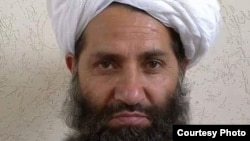Al-Qaida chief Ayman al-Zawahiri on Saturday pledged support for new Afghan Taliban leader Mullah Hibatullah Akhundzada, in a move widely seen by Western analysts as an attempt to limit the growth of the rival Islamic State militancy in Afghanistan.
Zawahiri's endorsement came in a 14-minute video posted online. In it, he described Akhundzada as the "emir of believers" and the "legitimate" head of a Muslim caliphate.
For its part, the rival Islamic State — staunchly opposed by Zawahiri and his followers — pledges allegiance to Abu Bakr al-Baghdadi. The IS leader, who has ordered all Muslims to obey him, declared the creation of a caliphate in 2014 that includes large parts of Iraq and Syria.
Akhundzada's predecessor, Mullah Akhtar Mansour, was killed last month in a U.S. drone strike in Pakistan, near the Afghan border.
At that time, U.S. officials said President Barack Obama approved the strike because the Taliban leader was "an obstacle to peace" and was overseeing plans for new attacks on U.S. targets in the Afghan capital. Obama later called the killing an "important milestone in our long-standing effort to bring peace and prosperity to Afghanistan."
The drone attack — the first known U.S. strike against a senior Afghan Taliban leader in Pakistan's Baluchistan province — sent shock waves through the region, with Pakistan's Foreign Ministry calling it a violation of Pakistani sovereignty. Pakistani officials say they thought Mansour was in fact preparing to enter long-stalled peace talks with the government.
U.S. strategists have long argued that Pakistan's military and intelligence units provide safe haven for Afghan Taliban fighters. Islamabad routinely denies those accusations, despite the facts that Taliban leaders have long used the country's tribal areas as a refuge, and that the group's top leadership was based in the western city Quetta.





